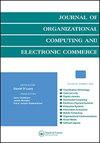ADVERGAME FOR PURCHASE INTENTION VIA GAME AND BRAND ATTITUDES FROM ANTECEDENTS OF SYSTEM DESIGN, PSYCHOLOGICAL STATE, AND GAME CONTENT: INTERACTIVE ROLE OF BRAND FAMILIARITY
IF 1.9
4区 管理学
Q3 COMPUTER SCIENCE, INFORMATION SYSTEMS
Journal of Organizational Computing and Electronic Commerce
Pub Date : 2022-01-02
DOI:10.1080/10919392.2022.2038526
引用次数: 3
Abstract
ABSTRACT Advergame is important as a new form of digital marketing and few studies have shown a complete model structure along with understanding the antecedents of online purchase intention. Based on the hierarchy of effective and relevant behavioral theories, we propose a research model with four components: consumer beliefs, advergame attitude, brand attitude, and purchase intention. The elaboration likelihood model (ELM) is used as a complementary lens to define three game beliefs: advergame design, psychological state, and advergame content. A comprehensive literature review is further classified to define their comprised elements. Brand familiarity is shown as a moderator for the link of advergame and brand attitude due to a connection to behavioral theories. Empirical study consists of an online survey of 477 consumers who had recent experience of advergame playing. Most variables for game beliefs, including game-brand fit, perceived interactivity, involvement, entertainment, and receptiveness, show significant, positive effects on advergame attitude. Besides, advergame attitude reports an important, direct link with purchase intention. Brand familiarity indicates importance as the moderator.从制度设计、心理状态、游戏内容等因素看游戏购买意愿广告与品牌态度&品牌熟悉度的互动作用
广告游戏作为一种新型的数字营销形式十分重要,但很少有研究能够在理解网络购买意愿前因的基础上构建完整的广告游戏模型结构。基于有效的相关行为理论层次,我们提出了一个包含消费者信念、广告游戏态度、品牌态度和购买意愿四个组成部分的研究模型。细化可能性模型(ELM)被用作补充视角来定义三种游戏信念:广告游戏设计、心理状态和广告游戏内容。全面的文献综述进一步分类,以确定其组成要素。品牌熟悉度在广告游戏与品牌态度之间起调节作用,这与行为理论有关。实证研究包括对477名最近体验过广告游戏的消费者进行在线调查。游戏信念的大多数变量,包括游戏品牌契合度、感知交互性、参与性、娱乐性和接受性,都对广告游戏态度有显著的积极影响。此外,广告游戏态度与购买意愿有着重要而直接的联系。品牌熟悉度表明其作为调节者的重要性。
本文章由计算机程序翻译,如有差异,请以英文原文为准。
求助全文
约1分钟内获得全文
求助全文
来源期刊

Journal of Organizational Computing and Electronic Commerce
工程技术-计算机:跨学科应用
CiteScore
5.80
自引率
17.20%
发文量
7
审稿时长
>12 weeks
期刊介绍:
The aim of the Journal of Organizational Computing and Electronic Commerce (JOCEC) is to publish quality, fresh, and innovative work that will make a difference for future research and practice rather than focusing on well-established research areas.
JOCEC publishes original research that explores the relationships between computer/communication technology and the design, operations, and performance of organizations. This includes implications of the technologies for organizational structure and dynamics, technological advances to keep pace with changes of organizations and their environments, emerging technological possibilities for improving organizational performance, and the many facets of electronic business.
Theoretical, experimental, survey, and design science research are all welcome and might look at:
• E-commerce
• Collaborative commerce
• Interorganizational systems
• Enterprise systems
• Supply chain technologies
• Computer-supported cooperative work
• Computer-aided coordination
• Economics of organizational computing
• Technologies for organizational learning
• Behavioral aspects of organizational computing.
 求助内容:
求助内容: 应助结果提醒方式:
应助结果提醒方式:


